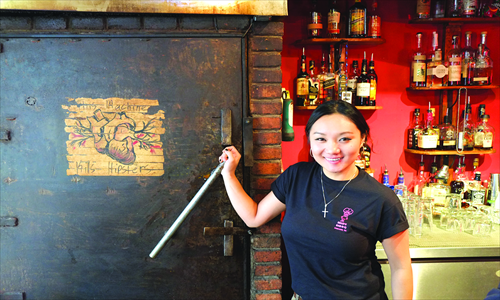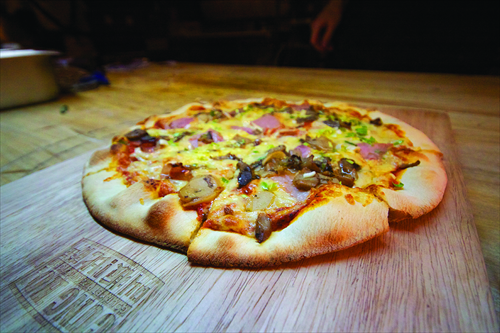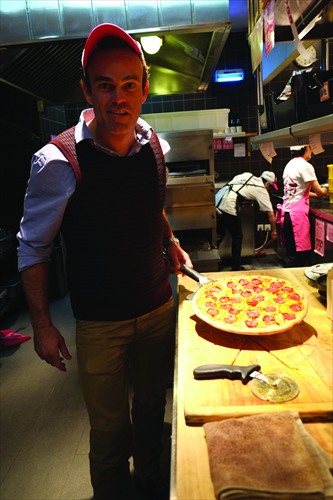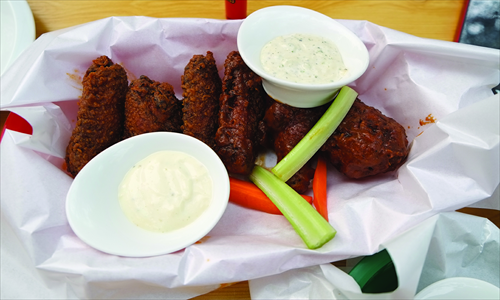Taking a bigger bite

Home Plate BBQ co-owner Liu Rongrong, who with American fiancé Adam Murray runs the Southern US cuisine restaurant. The business targeted foreign university students when it opened in 2009, but now around 60 percent of its customers are Chinese. Photo: Yin Lu/GT
Beijing can be a city of dreams for expat entrepreneurs eyeing their fortune in the hospitality industry. Every year scores of bars and restaurants run by foreigners sprout up around town, but one of the first lessons owners learn is that success can be elusive even if you have a sound business plan and tireless work ethic.
Statistics released by the State Administration for Industry and Commerce in July found that half of all businesses in China fail within the first five years, while less than 18 percent make it beyond a decade.
It's common for expat-run businesses to boom in their early days due to support from foreign customers eager to wine and dine at the newest venue on the bar and restaurant scene. But long-term success depends on tapping the vast yet discerning Chinese market, who might not ordinarily be fond of Western cuisine or drinking culture.

A smoked pork and mushroom pizza at Gung Ho! Pizza. Photo: Courtesy of Jade Gray

Jade Gray, the company's co-owner at its Lido store. Photo:Yin Lu/GT
Eyeing a bigger market slice
One expat-run business that has thrived since it opened in 2010 is Gung Ho! Pizza. With its bright pink decor and staff shouting their catchphrase - "Go, go, go!" - there is always a noticeable presence of Chinese customers. Many are drawn to the company's four stores in the city by their lively atmosphere, which offers stark contrast to staid Beijing time-renowned restaurants.
But Gung Ho! Pizza co-owner Jade Gray admits Chinese faces were a rare sight when the business first opened.
"When we started, just 5 percent of our customers were Chinese," said Gray, 38, who runs Gung Ho! Pizza with fellow New Zealander, John O'Loghlen.
"Our goal is to have 95 percent of our customers Chinese. We love foreigners, but the future of our business doesn't lie with them."
In just three years, Gray and O'Loghlen have grown their Chinese customer base from 5 percent to 60 percent.
Dai Menglin, 25, said he and his girlfriend were persuaded to visit Gung Ho! Pizza's Lido store for dinner on Saturday night after reading positive feedback from Chinese customers on popular restaurant review website dianping.com.
"We live nearby, and order [Gung Ho! Pizza] from home sometimes. We hope the store will expand in size because it can be difficult to get a table here," he said.
Making leaps and bounds
Across town in Sanlitun, Great Leap Brewing run by American Carl Setzer and his wife Liu Fang has also found success luring Chinese and foreign customers since opening its doors in May.
Great Leap Brewing hopped into Beijing in 2010, when Setzer and Liu dabbled in brewing craft beers. The husband and wife duo invited a small group that snowballed into 60 people to try their selection of locally brewed beers to determine if there was a market for them.
Word of mouth spread and soon many people were wanting to sample the beers, convincing Setzer to quit his six-figure salary job in IT and open a beer garden in a courtyard a few hutong twists and turns away from Nanluoguxiang, Dongcheng district.
While foreigners make up the bulk of drinkers at the courtyard brewery, the story is far more different at Great Leap Brewing's Sanlitun venue where up to 90 percent of customers are Chinese.
"There are more foreigners [at the Sanlitun venue] during weekends. Chinese crowds tend to avoid peak hours and come on weeknights after 10 pm," said Liu.
"We definitely expect more Chinese customers. The whole idea of [beers brewed by] Great Leap Brewing is to use local ingredients."
Even if Setzer and Liu are confident about their business surviving its first five years, not all their Chinese customers share this optimism.
Liu noted one of the more humorous reviews of the business came from a Sina Weibo user who claimed it had "strong liquor, low prices and stupid people." The cryptic, tongue-in-cheek message? Take advantage of the business before it closes down.
"Chinese people think: 'These people are stupid, so we need to buy this beer now because they don't know what they are doing and will be out of business soon.' But at the same time, foreign customers are saying that we are ripping them off and it's too expensive," Setzer laughed.
Liu and Setzer said they were surprised to learn Chinese women ranked high among Beijing's beer drinkers.
"A lot of Chinese women have told me that they never thought they would enjoy a beer before," said Liu.
"It's interesting to see many of those groups [of drinkers] are women," said Setzer, noting the customer gender divide was about 50:50.
"A lot of women are like, 'don't tell me that's a feminine beer.'"

Home Plate BBQ's chicken wings with homemade sauce. Photo:Yin Lu/GT
Pitching close to home
Home Plate BBQ, which serves Southern US cuisine, started in owners Adam Murray and his fiancée Liu Rongrong's apartment as a small delivery business in 2009. Their main target market was initially narrow: foreign students at the University of International Business and Economics, Liu Rongrong's alma mater.
Now, the couple is preparing to open a second Home Plate BBQ restaurant in Sanlitun in addition to their main one on Xiaoyun Lu near the East Third Ring Road.
"At first, we didn't have many orders. Everybody jumped up whenever the phone rang for a delivery," laughed Liu Rongrong.
One advantage was opening their restaurant in Xiaoyun Lu, just a short stroll from subway station Sanyuanqiao on the airport express line.
"Many customers got off the plane and came straight here for a cheeseburger directly from the airport with their luggage," said Liu Rongrong.
Liu Rongrong said her love affair with food from the US South came after tasting homemade fare cooked by Murray's family, especially smoked ribs. The couple decided to start small as a food delivery business, but was persuaded to think bigger when they realized the potential of the Chinese market.
Like Great Leap Brewing and Gung Ho! Pizza, most diners early on were expats. But now around 60 percent of Home Plate BBQ customers are Chinese.
Liu Rongrong attributed the restaurant's popularity to its original tastes of signature menu items like the pulled pork sandwich and smoked chicken wings. "Many older [Chinese] customers came in with an unhappy expression because they were dragged here by their children and didn't really like Western food, but they ended up liking our ribs in the end," said Liu Rongrong.
Jenna Merrill, a Home Plate BBQ regular customer originally from the US state of Pennsylvania, said she brings her Chinese friends to the restaurant "all the time."
"I noticed that a lot of Chinese people do come. Maybe they're curious about American culture," she said, noting consistency in taste kept her coming back. "If [Liu and Murray] do change [the taste], I think a lot of foreign customers will stop coming. The whole reason they go is to have the same taste as back home."
Value of building corporate 'face'
Gung Ho! Pizza's first store in Sanlitun suffered poor business during its first six months, which Gray and O'Loghlen attributed to the restaurant's hard-to-find location. They resolved to close their doors for good unless sales picked up over the next three months.
Fortunately for the Kiwi duo, business did bounce back thanks to an expansion of pizza varieties, Gray said.
"We have the classics, like pepperoni and margarita, which we keep original. But we also offer tastes that Chinese might like," he said. "We've tried everything, including Peking duck, Xinjiang lamb shashlik and many ingredients from Chinese cuisine. Every quarter we invite famous Chinese chefs to create a new menu for us."
Gray pinpointed the main challenge facing expat restaurant owners as "redefining the value of your brand" to build "face."
"Chinese diners come for something different - for a trend, or for face. If you are in an office and you order Gung Ho! Pizza and your colleague orders Domino's, the latter might go on dianping.com [to look up Gung Ho! Pizza] and say: 'Wow! High scores, more expensive - it must be trendy,'" Gray said.
"In China, with face [customers] are willing to pay more money for a product."
Chain businesses in the hospitality industry have a relatively short history in China of only about 20 years or so. Having a catchy name isn't everything, but Gray said it definitely helps.
"My secret [of building a chain] lies in the name," said Gray. Gung Ho! Pizza borrowed its name from a phrase used by US Marines, who mimicked Chinese soldiers' chants of "gong he," ("work together") to represent an enthusiastic attitude.
Gung Ho! Pizza and Home Plate BBQ are both looking to expand as chains, the latter even setting its sights overseas.
As Great Leap Brewing continues its rise, Liu Fang has learned to deal with the good and bad aspects of having an expat at the helm.
"There are pros and cons of my husband being a foreigner [and running a business]," she said. "On the bright side, at least our suppliers think foreigners are strict and not to be messed with."